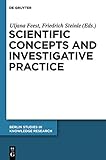Scientific Concepts and Investigative Practice / ed. by Uljana Feest, Friedrich Steinle.
Material type: TextSeries: Berlin Studies in Knowledge Research ; 3Publisher: Berlin ; Boston : De Gruyter, [2012]Copyright date: ©2012Description: 1 online resource (302 p.)Content type:
TextSeries: Berlin Studies in Knowledge Research ; 3Publisher: Berlin ; Boston : De Gruyter, [2012]Copyright date: ©2012Description: 1 online resource (302 p.)Content type: - 9783110253603
- 9783110253610
- 001.4 22/ger
- Q180.55.M4 S395 2012
- Q180.55.M4
- online - DeGruyter
- Issued also in print.
| Item type | Current library | Call number | URL | Status | Notes | Barcode | |
|---|---|---|---|---|---|---|---|
 eBook
eBook
|
Biblioteca "Angelicum" Pont. Univ. S.Tommaso d'Aquino Nuvola online | online - DeGruyter (Browse shelf(Opens below)) | Online access | Not for loan (Accesso limitato) | Accesso per gli utenti autorizzati / Access for authorized users | (dgr)9783110253610 |
Frontmatter -- Contents -- Scientific Concepts and Investigative Practice: Introduction -- Concept as Vessel and Concept as Use -- Rethinking Scientific Concepts for Research Contexts: The Case of the Classical Gene -- The Dynamics of Scientific Concepts: The Relevance of Epistemic Aims and Values -- Goals and Fates of Concepts: The Case of Magnetic Poles -- Mathematical Concepts and Investigative Practice -- Experimentation and the Meaning of Scientific Concepts -- Exploratory Experiments, Concept Formation, and Theory Construction in Psychology -- Early Concepts in Investigative Practice— The Case of the Virus -- Scientific Concepts in the Engineering Sciences -- Modeling Practices in Conceptual Innovation -- Conceptual Development in Interdisciplinary Research -- List of Contributors -- Index of Names
restricted access online access with authorization star
http://purl.org/coar/access_right/c_16ec
Recent philosophy and history of science has seen a surge of interest in the role of concepts in scientific research. Scholars working in this new field focus on scientific concepts, rather than theories, as units of analysis and on the ways in which concepts are formed and used rather than on what they represent. They analyze what has traditionally been called the context of discovery, rather than (or in addition to) the context of justification. And they examine the dynamics of research rather than the status of the finished research results. This volume provides detailed case studies and general analyses to address questions raised by these points, such as:- Can concepts be clearly distinguished from the sets of beliefs we have about their referents?- What - if any - sense can be made of the separation between concepts and theories?- Can we distinguish between empirical and theoretical concepts?- Are there interesting similarities and differences between the role of concepts in the empirical sciences and in mathematics?- What underlying notion of investigative practice could be drawn on to explicate the role of concept in such practice? - From a philosophical point of view, is the distinction between discovery and justification a helpful frame of reference for inquiring into the dynamics of research?- From a historiographical point of view, does a focus on concepts face the danger of falling back into an old-fashioned history of ideas?
Issued also in print.
Mode of access: Internet via World Wide Web.
In English.
Description based on online resource; title from PDF title page (publisher's Web site, viewed 28. Feb 2023)


